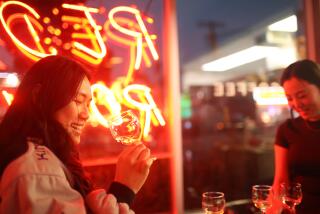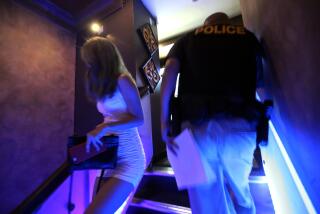Karaoke Industry Singing the Blues
- Share via
TOKYO — After a decade in the karaoke business, lounge owner Kagura Muto has heard her share of sour notes. But business of late has been a different sort of flat.
Under the white-hot spotlights at her bar, a retiree cuts loose a raucous, rough-on-the-ears rendition of “I Left My Heart in San Francisco.” Nary a soul is here to clap.
“Ten years ago, this place would have been packed with 20 people,” Muto complained after punching in the off-key crooner’s next song. “Now nobody wants to sing. It’s all because of the bad economy.”
Considered by many Japan’s most insidious export since Godzilla, karaoke blossomed into a global, multibillion-dollar business after its 1971 inception by a Japanese rock drummer who can’t read a note of music.
Fanatics rave about its health benefits, drunken bellowers consider it the great social leveler and the uninitiated find it hard to resist. Karaoke has become as universally recognized as Mt. Fuji, and sing-along soundtracks provide alter-egos for millions of Sinatra wannabes from Laos to Las Vegas.
But in the land of its birth, karaoke buffs are singing the blues.
Japan’s decade-long economic slump has spurred a five-year slide in the number of karaoke bars and singers. Some of its biggest karaoke companies are abandoning the business, while others are trying such innovations as karaoke songs on mobile phones and karaoke for the car.
Fans decry the decline of the only pastime that lets tone-deaf crooners indulge their inner Madonna.
“Karaoke can’t die,” insisted Yumiko Fujii, crowned the country’s No. 1 karaoke songster at the All-Japan Karaoke Throne Battle in November. “It’s really too bad people are spending less money on it. Karaoke’s like a vitamin pill for the heart.”
Karaoke’s decrescendo began with the collapse of Japan’s booming bubble economy. Soaring corporate bankruptcies and record unemployment forced a budget-strapped public to cut back on karaoke nights that often run hundreds of dollars.
The number of participants peaked in 1994 and has tumbled nearly 20% since, according to the “Karaoke White Paper,” released in October by the All-Japan Karaoke Industrialist Assn. The number of places to sing began shrinking two years later and has plunged 16% as more shops go belly up.
Still, that leaves 48 million Japanese inflicting their voices from behind the microphone -- ample evidence that karaoke is far from its final refrain.
The average Japanese goes singing 10 times a year, and thousands enroll in karaoke classes. Several karaoke channels are standard fare on cable television. Train stations are still surrounded by multistory, neon-lighted karaoke palaces, where bosses, underlings, families and friends gather in smoky “boxes” with sticky floors to belt out tunes and throw back beers.
But industry officials warn that the downward trend has just begun and is taking an increasingly bigger bite out of the $7.3-billion-a-year business.
“The karaoke boom is over,” said Shirou Kataoka, director of the trade group. “If Japan’s economy doesn’t recover, neither will karaoke.”
Giga Networks Co., a major maker of karaoke machines, was among the first to leave the field. It says selling downloadable ringing tones for mobile phones is more profitable.
Tokyo-based Clarion, the first to mass-market karaoke equipment in the 1970s, followed suit. Its karaoke sales had tumbled 50% over the last 10 years.
Karaoke is also a victim of a passe image.
“Nowadays, young people would rather spend their money on their mobile phones,” said karaoke’s 62-year-old inventor, Daisuke Inoue, who compares its sliding fortune with the Japanese fads for bowling and billiards that boomed, then faded.
Underscoring the trend, “Evening Hit Parade,” a must-see Saturday night TV show for years that featured celebrities singing their favorite karaoke tunes, was recently scrapped.
Karaoke’s promoters are trying hard to freshen its image.
Some machines calculate how many calories a singer burns, or play music-tailored workout videos to have people literally sweating and singing to the oldies. Others measure the singers’ pitch and tempo, and rate their singing prowess. The automatic applause button has also injected pep.
Toyota, in tandem with several karaoke firms, developed karaoke for the car. And toy maker Takara scored a hit with e-kara: Equipped with a snap-on, credit-card-sized song cartridge, the e-kara microphone plugs into any television, transforming it into song-box. Priced at $50, it’s a recession-proof alternative to pricey bar tabs.
Then there’s dial-a-song. Just ring up the karaoke hot line on your mobile phone and download the latest hits to serenade innocent bystanders. Taito Corp. is working on a karaoke machine that will automatically correct a singer’s voice to smooth out noxious notes.
For the hard-core crowd, all that is just a diversion. They’ll keep singing no matter what because karaoke is more than a hobby; it’s a lifestyle.
Grand champion Fujii has a case full of trophies to prove it.
“I practice singing every day in the car,” she said before belting out a gale-force song in a cramped karaoke room decked out with signature spotlights, lounge chairs, and a full spread of French fries, squid rings and crispy shrimp chips.
“My husband only sings after he’s had a couple drinks in him,” she said. “The thinking is completely different.”
For Fujii and thousands of others entering contests every year, karaoke is a world of flashy clothes, soft-focus videos and structured etiquette: Always ask before barging in on someone else’s song and keep clapping under control.
Dressed in her best karaoke finery of knee-high leather boots and low-cut black velvet dress, Fujii delights in letting loose with the high notes. Staring at the ceiling, she sways her arm like a snake charmer in a world all her own. “I like singing just for myself,” Fujii said. “When I am singing, I feel like the local star.”
More to Read
The biggest entertainment stories
Get our big stories about Hollywood, film, television, music, arts, culture and more right in your inbox as soon as they publish.
You may occasionally receive promotional content from the Los Angeles Times.










